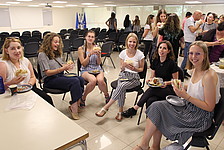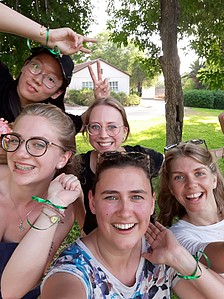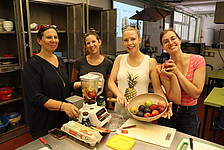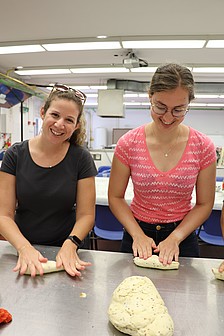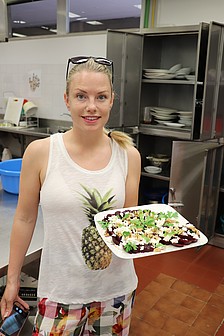Food-of-the-future - Nutritional and Technological Aspects
02 - 13 July 2023
Hebrew University of Jerusalem,The Robert H. Smith Faculty of Agriculture, Food and Environment, Rehovot, Israel
Introduction
According to the United Nations Environment Programme (UNEP), by 2050, the world population is expected to reach 10 billion people. This means that – feeding everyone calls for an increase of 56 percent in food production. Unfortunately, there are not enough resources available to provide food for the growing population and keep the same diet they consume today. This suggests that the crops we cultivate, and the food we eat today, will have to undergo significant changes. Accordingly, the crux researchers will have to solve is how to produce sufficient nutritional food using much fewer resources. This is the core issue of this course.
The course will introduce the students to the various alternatives and substitutes for our future foods as well as the scientific evidence concerning its nutritional benefits. This knowledge will allow the students to achieve unique insights into the food-of-the-future together with cutting-edge scientific evidence of its advantages and disadvantages.
Maximum number of participants: 30
Pre-requisites
The course is aimed at students of biology, nutrition and food technology, or related subjects.
Application
Please fill out the application form and send it to Ms. Noa Schwarzwald, at the International School of Agricultural Sciences, Robert H. Smith Faculty of Agriculture Food and Environment, Rehovot, Israel.
Application Deadline
May 1 2023, or until places are filled
Course content
The course will cover the following topics:
1) Lectures
- Why do we need Food-of-the-Future?
- The sources for Food-of-the-Future (Production of meat alternatives using cultures, live cells, insects and plant proteins), (Why yeast as an alternative source of nutrients and functional substances for innovations in food technology?)
- What will our plate look like in 2050?
- Innovations in technology for Food-of-the-Future (Nonthermal technologies in food processing)
- Nutritional and health aspects of Food-of-the-Future
- Food-of-the-Future and the environment
- Meat and dairy substitutes
- Protein alternatives (edible insect as alternative protein source)
- 3-D printing of food
- Sustainable food production
- Plant-based meat and dairy products substitutes and methods of their production
2) Technical visits
- An organic farm & visitor center
- A technological incubator (start-up) for protein substitutes
- A technological incubator (start-up) for meat substitutes
- A technological incubator (start-up) for dairy substitutes
- A kitchen workshop – Preparation of Food-of-the-Future
- Visits to laboratories on campus
3) E- learning
A website of the course will be created, which will serve as an interactive platform where students and mentors will be able to dialogue and exchange views before course and for the preparation of the final guided project.
Intended Learning Outcomes (ILO)
After completing the course, the students will become aware of one of the major challenges in our Western society – development of our Food-of-the-Future. Present solutions will be discussed, and possible alternatives will be presented. The students will receive a toolbox allowing them to appreciate the know-how and implementations of Food-of-the-Future for use in their home countries.
Language
English
Course Format
Mix of lectures, technical visits, guided projects and excursions.
Credits
7.5 ECTS
Type of Assessment
Registered students will choose a topic among topics of lectures 1-7 and present it in 10-15 min lectures.
Cultural Activities/Social Program
Welcome & farewell party, Israeli cultural night, sightseeing tours
Costs
Travel expenses and food are not included. Partial stipends are available to cover part of the costs only for students who are coming from ELLS institutions: https://www.euroleague-study.org/en/universities.
**Tuition fees – free only for students who are coming from ELLS institution.
Accommodation: on-campus guest house, ‘Reisfeld Residence’, € 45 per night.
Health insurance
compulsory
Visa
Students, which are nationals of the ELLS participating countries**, do not need a visa to Israel. Otherwise please contact MS. Noa Schwarzwald to see whether you need an entry visa to Israel.
Accommodation
Reisfeld residence, on the Smith Faculty campus
http://intschool.agri.huji.ac.il/reisfeld-residence
Contact person for scientific questions
Scientific questions should be addressed to the academic head of the summer school:
Prof. Dr. Oren Froy
Institute of Biochemistry, Food Science and Nutrition
The Robert H. Smith Faculty of Agriculture Food and Environment, Rehovot 76100, Israel
Tel: +972-8-9489746
Email: oren.froy@mail.huji.ac.il
Contact person for administrative questions
Administrative and other questions should be addressed to Summer School Coordinator:
Ms. Noa Schwarzwald.
The International School of Agricultural Sciences, The Robert H. Smith Faculty of Agriculture, Food and Environment, Rehovot 76100, Israel.
Tel: +972-8-9489996
Email: noapl@savion.huji.ac.il

